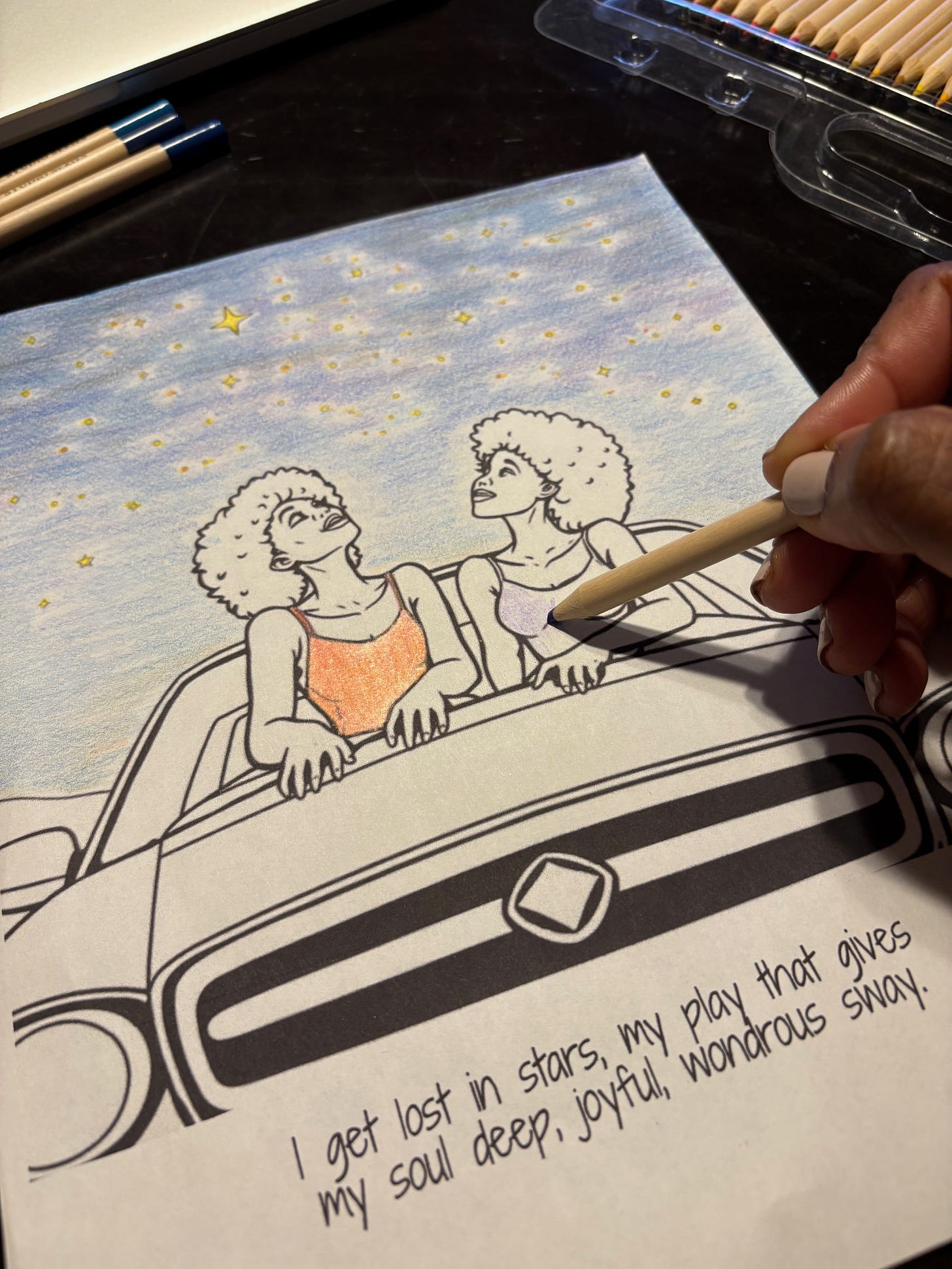Hoola hooping.
Throwing and catching jackstones.
Doodling.
Splashing in puddles, the mud squishing gloriously between your toes.
Dancing wildly in an open field without music.
Hiding and seeking.
Finger-painting with glorious abandon.
Dressing up dolls.
Cloud-gazing and letting imagination run free.
Writing silly poetry or nonsense things.
Building a magnificent woman cave from bedsheets without a care for laundry consequences and believing, truly believing again, it is impenetrable.
These are just a few examples of childhood passions—“little” play—waiting to be found or reclaimed. How did reading this list make you feel? Which ones on the list sparked a bit of happy within you?
This week in our Joyride in June, we’re rediscovering and taking up our childhood passions. Guilt free and eyes off screens.
I hope you already downloaded our free coloring book (check your email) and are working on your unique creations. Here’s a peek at mine (I’m trying).
Please do not shrug off the importance of engaging in childlike play as being just for children. It’s much bigger than that.
Numerous scientific studies show that such play activates the nervous system in ways that induce relaxation, reduce anxiety and cortisol levels, promote learning, raise adaptive creativity, and improve overall well-being. It offers reconnection to innocence and freedom, affirming that joy is a birthright, not a reward.
It is also a form of remembering who you were before the world told you who to be and shaped you into its image.
For Black women navigating daily microaggressions and stressors—and who are 1.5 times more likely than White women to report feeling sad most or all the time—, this is essential.
From a young age, many Black women were taught to grow up quickly, to protect ourselves from the world’s harshness, and to take care of others before we’ve even figured out how to care for ourselves. Many of us grew up in environments where joy was interrupted by trauma, where safety wasn’t always guaranteed, and where being “too loud,” “too soft,” or “too much” was corrected before it could be celebrated.
In this ongoing push toward responsibility, self-sacrifice, and “hush up, girl”, we often leave behind the sacredness of play.
Reclaiming child’s play gives us a chance to meet that younger self with love, forgiveness, and the option to choose joy.
This is not about softness or whether you deserve it or not. It’s about an intentional, radical act of self-liberation. It’s about a necessary gateway back to ourselves—a revolutionary return to joy, creativity, and healing. It’s about challenging systems that only value us when we are producing, caretaking, or enduring.
Play reminds us that we are not machines. We are whole beings with imaginations, desires, and dreams. When we allow ourselves the space to explore and create like children do, we tap into a freedom that oppression tries to silence. It is what allows us to dream beyond societal constraints to reimagine self-worth and identity and spark innovation in our personal or professional life. When we play, we exercise the parts of ourselves that can invent new stories, new paths, and new ways of being. We remember that we can define ourselves, become true self, and build new visions for our lives, our communities, and our futures.
So, this is an invitation to return to sidewalk chalk, silly faces in the mirror, storytelling, dancing in the kitchen, doodling in notebooks, swinging on a swing, and making something just because it makes you smile.
You do not have to earn your joy nor ask for permission to go outside and play.
True Selfers’ practice this week
Be playful. Recall your favorite child’s play or one you wish you had. Don't just think about what it was but immerse yourself in the sensory details—what you see, hear, smell, and feel physically and emotionally. Once the memory is vivid, find a small, symbolic way to engage with an element of that play this week, even if you can't replicate the exact activity. Reply email or post in our in-app Chat to let the rest of us know how you played.
Repeat daily this week’s hymn: “I play, therefore I am.”
Add this spirited and beloved song, “Guantanamera” by Playing For Change, to your play soundtrack. It’s part of my coloring fun and the name of its producers speak of my own intent to play for change.
Journey on,
Netta Fei






‘You do not have to earn your joy.’ 🙌